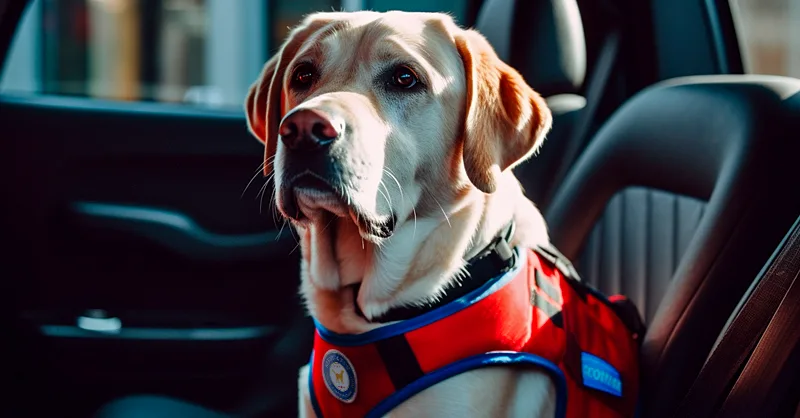Archive for the ‘Service Dog Tips’ Category
A service dog provides invaluable assistance to a handler with disabilities by completing specific tasks it was trained for. Owners lead more independent lives, have easier access to places, and may move about with greater confidence, knowing that their trained service animal is there to assist them.
Many tasks that non-disabled people take for granted may simply be out of reach for some disabled individuals, such as picking up dropped objects, safely crossing a city street, or opening a door or elevator.
Service dogs are not pets – at least not in the way that many people think of a pet. The tasks a service animal performs aren’t tricks but rather life-enhancing and sometimes life-saving duties. These are working dogs trained to complete specific tasks and respond to both verbal and non-verbal cues their owners give.
The primary role of a service dog varies; depending on their handlers’ needs, their tasks are different. But in all cases, the service dog is intended to provide assistance for physical or psychological health issues their handler might experience daily.
Service animals are covered by the Americans With Disabilities Act (ADA). They are afforded more access than regular pets or even emotional support animals. In Arizona, service dogs are permitted in the workplace, restaurants, hotels, and airplane cabins.
Disability as Defined by the Americans with Disabilities ActThe ADA offers many protections for individuals with a disability. The term disability is defined as “a physical or mental impairment that substantially limits one or more major life activities.” Discrimination against people with disabilities was much more common before the passage of the ADA, including limited access to public places or public transportation, refusal of service in a restaurant or store, lower pay in the workplace, and discrimination in the hiring process.
The ADA guarantees people with disabilities freedom from discrimination in the workplace, and business places. Furthermore, the ADA ensures reasonable accommodations in stores, at work, and when traveling. Reasonable accommodations could include installing wheelchair ramps in stores and restaurants, providing software that translates text to speech, and allowing a trained service animal to accompany the owner to help them complete specific tasks.
The ADA’s Definition of Service AnimalsThe ADA defines a service dog as “any dog that is individually trained to do work or perform tasks for the benefit of an individual with a disability.” The ADA protects those with both physical and mental or emotional disabilities.
The ADA only legally protects service dogs, explicitly prohibiting any other species of animal, from federal protection.
A service dog is selected for its intelligence, trainability, and temperament. Not every dog is capable of being a service dog, and every service dog will be trained to perform one or more specific tasks. Service dogs are commonly trained to:
guide blind or visually impaired people alert a deaf handler to certain sounds or danger provide non-violent protection retrieve dropped items pull a wheelchair detect the presence of certain allergens, and alert their highly sensitive handler provide support with stability or mobility limitations clear a room for a handler with PTSD, and provide reassurance during panic attacks retrieve medicationThese services are vital for the well-being and safety of the handler. Therefore, the service dog is allowed to remain with their handler at all times.
A fully trained service dog can remain with their handler at all times. Arizona Service Dog RegistrationThe state of Arizona does not require a service dog registration, nor is it mandatory for owners to have specific tags or vests identifying the service dog. The only requirement for a service dog handler is to state that the dog is a service dog and name the tasks it is trained to perform.
However, many service dog handlers find it reassuring to have a service dog registration and accompanying ID card. These items make it easier to navigate in public places and instantly show others that you have a working dog that should not be interfered with.
Arizona Law Protects Service DogsArizona law allows accessibility for a service dog anywhere the owner goes, making discrimination against the owner and dog illegal. Furthermore, the service dog’s actions are protected; people may not interfere with or obstruct the dog’s activity when it’s working. In Arizona, it’s a Class 3 misdemeanor to prohibit access for a service dog.
Your Rights as a Service Dog HandlerYour freedom and rights for employment, housing, and access to public places as a disabled person are guaranteed by the ADA. These civil rights cannot be taken away or restricted, and you are entitled to reasonable accommodation.
Such accommodation includes your service animal, and your word that the dog is a legitimate working animal is enough to grant you and your service dog access to all public places. You do not need to present a service dog certification to exercise your rights.
Although Arizona does not require service dog accessories, most handlers find it easier to provide their dog with a vest to indicate that it’s working and should not be touched or disturbed.
Many also find that registering their service animal with a reputable organization, such as Service Dog Certifications, helps when questioned about the presence of their animal on the premises.
Uber’s policy: Service dogs are allowed to ride with their handlers at no extra cost. According to Uber’s guidelines, drivers are required to accommodate service animals and provide them with the same level of service as any other passenger.
What if your driver gives you a hard time?If an Uber driver refuses to allow your service dog in the car or you face harassment, you can file a complaint with Uber.
To file a report from the Uber Rider App, navigate to the “I Want To Report A Service Animal Issue” screen, available through the trip details screen and the account menu button.
After you file a report, Uber’s team will investigate the incident and act under its Service Animal Policy.
Uber Cleaning FeesYou do not have to pay any additional cleaning fees for hair or shedding from your service dog. If you are charged a cleaning fee after your ride has ended, you can contact Uber to request a refund.
Proving you have a service dogIf the driver wants to verify that you own a service dog, they can ask two questions: 1. Is the dog a service dog required for a disability? and 2. What work or task has the dog been trained to perform?
It can also be helpful to identify your dog as a service animal by carrying an ID card or using accessories like vests and tags. The driver, however, cannot refuse your ride if you do not have these items.
Practical Tips 💡 Make sure the driver is aware that your dog is a service animal so they do not mistakenly believe that it is a pet. Most drivers appreciate it if you keep your service dog on the vehicle’s floor (unless your service dog is needed on your lap or by your side to provide its disability-related service). You are not responsible for cleaning fees for hair or shedding. However, it’s courteous to clean up after your dog whenever possible.Individuals in Illinois who require the assistance of a service dog are recognized and protected by federal and state laws. The Americans with Disabilities Act (ADA) and the Illinois Human Rights Act safeguard the rights of service dog owners in the Prairie State.
Illinois law allows service dogs to enter public areas, including places where dogs are typically prohibited. Keep reading to learn more about the requirements and rights of service dogs in Illinois.
Health RequirementsTo be eligible for a service dog in Illinois, the handler must have a qualifying physical or mental health disability. A “disability” is defined as a physical or mental impairment that significantly restricts a major life activity such as working, socializing, or attending school.
Physical disabilities include visual impairment, hearing loss, and seizures. Meanwhile, psychiatric disabilities include conditions like severe depression, anxiety, post-traumatic stress disorder (PTSD), and autism. Psychiatric service dogs are trained to support individuals with mental health conditions.
Training RequirementsMerely having a qualifying disability does not automatically qualify an individual for a service dog in Illinois. The dog must be specifically trained to perform tasks directly related to the handler’s condition.
Service dogs are trained to perform a wide range of tasks. Some examples of tasks for physical disabilities include pulling wheelchairs, guiding individuals with visual impairments, and providing assistance during seizures.
On the other hand, tasks for psychiatric disabilities may include retrieving medication, providing tactile stimulation during moments of crisis, calming the handler during panic attacks, and assisting in crowded environments.
It is essential to note that service dogs in training do not have the same public access rights as fully trained service dogs.
Keeping a training log will help with analyzing the progress of your service dog’s training. Download this free sample Service Dog Training Log, provided by Service Dog Certifications.
Identification Requirements for Service Dogs in IllinoisWhile most service dog owners use accessories like ID cards, vests, tags, and certificates to signal that their dog is a service dog, these items are not required in Illinois. However, service dog owners may prefer to use these items to identify their dogs as service animals and prevent unwanted interactions with their dogs while on duty.
When a service dog handler’s disability is not apparent, stores, restaurants, and other public venues in Illinois may ask two questions to determine if the dog is a service dog:
Is the animal a service dog required for a disability? What work or task has the dog been trained to perform? Service Dog Registration in IllinoisThere is no specific registration requirement for service dogs in Illinois. However, you may have to register your dog if there is a local rule that requires registration of all dogs.
While service dog registration is optional, many handlers choose to register their service dogs voluntarily. By registering their service dogs with a service like Service Dog Certifications, the dog’s information is entered into a searchable database linked to an ID card.
Service dog handlers can use this card to demonstrate that their dog is a service dog, which may be convenient when third parties demand documentation. However, keep in mind that no one can condition entry of a service dog on having any type of documentation or paraphernalia.
A service dog registration in Illinois can be useful to service dog handlers when confronted with the outside world. Psychiatric Service Dog RequirementsWhile most people associate service dogs with physical disabilities, service dogs also support individuals with psychiatric disabilities. In Illinois, psychiatric service dogs (PSD) have the same legal rights as other types of service dogs, as they are equally important to their handlers’ health management.
Psychiatric service dogs perform a wide range of tasks, including:
deep pressure therapy reminding the handler to take medication posting and watching the handler’s back in open areas providing tactile stimulation alerting the handler to oncoming threats or episodes disrupting repetitive self-destructive behaviors Wonder if you qualify for a Psychiatric Service Dog?Get an assessment from a licensed medical health professional. If you qualify, they can issue a PSD Letter so that you can confidently train and own a PSD. Where Can Service Dogs Go in Illinois?Service dogs in Illinois are permitted to accompany their handlers in public areas that do not allow pets. For example, handlers can bring their service dog to restaurants, shops, hospitals, schools, and hotels.
Service dogs also have housing rights and must be allowed to live with their handlers, even in buildings prohibiting dogs.
Service Dog Legal Cases in IllinoisThird parties can get in trouble when they violate the rights of service dog owners. There have been many legal cases involving service dogs in Illinois.
One of the cases involved a woman with a service dog who was denied access to a local restaurant. The woman filed a complaint with the Illinois Attorney General’s office, which resulted in a settlement requiring the restaurant to train its employees on the Americans with Disabilities Act (ADA) and pay a fine.
Another case involved a student with a service dog who was denied access to a university dormitory. The student filed a complaint with the U.S. Department of Education’s Office for Civil Rights, which resulted in a settlement requiring the university to revise its policies and pay a fine.
In a third case, a woman with a service dog was denied access to a hospital. The woman filed a complaint with the Illinois Department of Human Rights, which found the hospital had violated the Illinois Human Rights Act and ordered the hospital to pay damages to the woman.
These cases illustrate the importance of understanding the laws and regulations related to service dogs in Illinois and ensuring that individuals with disabilities are able to access public venues with their service animals.







